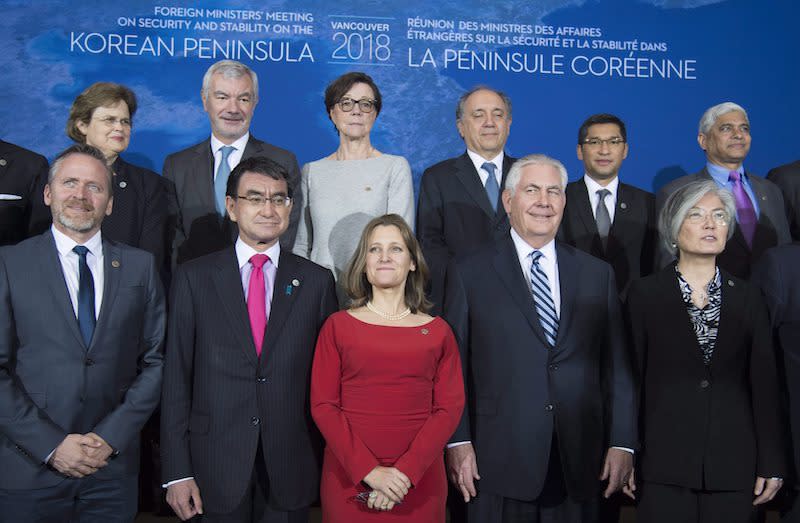Canada wants to help solve North Korea tension, but won't get far — for now

At the crossroads of war and peace, Canada is trying to assert itself as a global leader.
Since taking office, Prime Minister Justin Trudeau has declared “Canada is back” and “here to help.” The Liberal government has committed to re-engaging Canada in world affairs.
So it shouldn’t come as a surprise that Canada thrusted itself into the North Korean nuclear crisis with an international conference Tuesday in Vancouver, which was co-hosted by the U.S.
The meeting featured foreign ministers from 20 countries, including South Korea and Japan. Most of the participants fought on the UN side of the 1950-53 Korean War. However, there were some notable omissions.
North Korea, Russia and China, countries that fought on the communist side of the war, did not have seats at the table, and that could be seen as a missed opportunity.
“The other side is not represented at all,” Carleton University history professor Jacob Kovalio told Yahoo Canada. “And of course, this tells us something.”
Before the meeting, Russian Foreign Minister Sergey Lavrov reportedly called the meeting “destructive.” On Wednesday, China condemned it as a continuation of “Cold War thinking.”
Progress made on Korean Peninsula
Kovalio says the best thing that could’ve come out of the conference in Vancouver would’ve been a statement of support for continued dialogue between the two Koreas, which is what happened.
“The meeting on North Korea vows to support progress in inter-Korean dialogue in hopes that it leads to sustained easing of tensions,” a joint statement that followed the meeting said. “Participants at the North Korea meeting agreed that a diplomatic solution is both essential and possible.”
The participants also agreed to explore new measures against the North Korean regime, which has refused to back down from developing its missile and nuclear programs in the face of tough sanctions.
There have been signs of hope in recent days.
North and South Korea began re-engaged in diplomatic talks on Jan. 9 after more than two years of disengagement. The negotiations resulted in North Korea’s participation in the Olympic Games in Pyongchang, South Korea.
On Wednesday, Seoul announced the two sides would form a joint team and march together in the opening ceremony.
‘Signs of the old China continuing’
The real question is whether anything resulting from this conference will actually have an impact. And realistically, does Canada have a key role to play in the pursuit of peace in Korea?
In short, the answer is no, because according to Kovalio, this issue is all about China and their long game aimed at reducing U.S. influence in Asia.
The professor acknowledged how Canada, the U.S., China and others have agreed to UN sanctions, which have imposed even harsher sanctions against North Korea. But recently, “there have been signs of the old China continuing,” Kovalio said.
“In other words, the Chinese voting in favour of sanctions at the UN Security Council, and then undermining them in two ways.”
Beijing is facilitating the supplies of oil to the North Korean while pushing “real heavy sanctions” against Seoul, Kovalio explained.
For example, China banned tourists from travelling to South Korea as a retaliation for Seoul’s interest in expanding the U.S.-built Terminal High Altitude Area Defence (THAAD) anti-ballistic missile defence system, the professor said.
Beijing is trying to force Seoul against having an anti-missile defence system on the Korean Peninsula while “only going through the motions” on UN sanctions against North Korea, Kovalio explained.
The professor told Yahoo Canada that China’s long game is simple: gradually undermine the U.S. influence in southeast Asia by proving the U.S. to be a “paper tiger,” which is an entity that appears dangerous, but lacks real power.
Eyes on UN Security Council seat
As for Canada, it may be difficult for the Trudeau administration to appear as the broker of peace when they are supporting sanctions against North Korea. But there are some things the Canadians could do to show leadership.
Demonstrating support for allies in Washington, D.C., and Seoul to stop their massive military exercises on the Korean Peninsula could ease tensions. The two countries have already agreed to delay their joint maneuvers until after the Olympics, which have been known to infuriate the North.
Canada could also appeal to China for real, substantive action aimed at influencing North Korea. But that begins with bringing China to the table, which was not accomplished this week in Vancouver.
Trudeau has made it clear the Liberals have their eyes set on holding a seat on the UN Security Council. The election is set to take place in 2020 and Canada is currently competing against Norway and Ireland.
A spot on the council would be a nice feather in the cap for the Liberals, an accomplishment that eluded the country under former prime minister Stephen Harper.
But it might take more than co-hosting conferences with allies to get the world on board with Trudeau’s intentions to help, especially regarding an issue like North Korea’s nuclear program, where Canada doesn’t wield much influence.
And if there is to be a meeting aimed at securing peace, that might be more attainable with the inclusion of parties with the power to make a difference.


